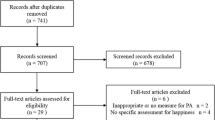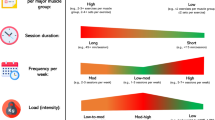Abstract
Purpose
Aerobic exercise is safe and feasible for rectal cancer patients during and after neoadjuvant chemoradiotherapy (NACRT), but their motivation to perform such exercise is unknown. Here, we explore the motivational outcomes, perceived benefits and harms, and perceived barriers to exercise during and after NACRT.
Methods
Rectal cancer patients (n = 18) participated in supervised aerobic exercise during NACRT followed by unsupervised exercise after NACRT. Using the theory of planned behavior, we assessed perceived benefits, harms, enjoyment, support, difficulty, and barriers for exercise both during and after NACRT.
Results
Patients reported that exercise during NACRT was more enjoyable (p = 0.003) and less difficult (p = 0.037) than initially anticipated. The most common perceived benefits of exercise during NACRT were cardiovascular endurance (75 %), quality of life (75 %), and self-esteem (65 %). After NACRT, the most common perceived benefits were physical functioning (93 %), cardiovascular endurance (86 %), and quality of life (79 %). The most common perceived harms of exercise during NACRT were fatigue (31 %), diarrhea (31 %), and skin irritation (24 %). After NACRT, the most common perceived harms were fatigue (21 %) and hand-foot-syndrome (15 %). Side effects from NACRT were the most common exercise barrier during NACRT (88 %) whereas lack of motivation was the most common barrier after NACRT (79 %).
Conclusions
Rectal cancer patients reported aerobic exercise during NACRT to be more enjoyable and less difficult than anticipated despite significant barriers. This positive motivational response may facilitate recruitment and adherence in future interventions. Moreover, rectal cancer patients identified potential benefits and harms that should be closely monitored in future interventions.
Similar content being viewed by others
References
Cravo M, Rodrigues T, Ouro S, Ferreira A, Féria L, Maio R (2014) Management of rectal cancer: times they are changing. GE J Port Gastrenterol 21(5):192–200. doi:10.1016/j.jpg.2014.06.003
Gavaruzzi T, Giandomenico F, Pucciarelli S (2013) Quality of life and functions after chemoradiation for rectal cancer: a review of recent publications. Curr Colorectal Cancer Rep 9(2):157–167. doi:10.1007/s11888-013-0161-x
Swellengrebel HA, Marijnen CA, Verwaal VJ, Vincent A, Heuff G, Gerhards MF, van Geloven AA, van Tets WF, Verheij M, Cats A (2011) Toxicity and complications of preoperative chemoradiotherapy for locally advanced rectal cancer. Br J Surg 98(3):418–426. doi:10.1002/bjs.7315
West MA, Loughney L, Lythgoe D, Barben CP, Sripadam R, Kemp GJ, Grocott MP, Jack S (2015) Effect of prehabilitation on objectively measured physical fitness after neoadjuvant treatment in preoperative rectal cancer patients: a blinded interventional pilot study. Br J Anaesth 114(2):244–251. doi:10.1093/bja/aeu318
Morielli AR, Usmani N, Boulé NG, Tankel K, Severin D, Nijjar T, Joseph K, Courneya KS (2016) A phase I study examining the feasibility and safety of an aerobic exercise intervention in rectal cancer patients during and after neoadjuvant chemoradiotherapy. Oncol Nurs Forum (in press)
Ajzen I (1991) The theory of planned behavior. Organ Behav Hum Decis Process 50:179–211
Godin G, Shephard RJ (1985) A simple method to assess exercise behavior in the community. Can J Appl Sport Sci 10(3):141–146
Ajzen I (2006) Constructing a theory of planned behavior questionnaire: conceptual and methodological considerations. https://people.umass.edu/aizen/pdf/tpb.measurement.pdf. Accessed January 14 2016
Peddle-McIntyre CJ, Bell G, Fenton D, McCargar L, Courneya KS (2013) Changes in motivational outcomes after a supervised resistance exercise training intervention in lung cancer survivors. Cancer Nurs 36(1):E27–E35. doi:10.1097/NCC.0b013e31824a78e4
Courneya KS, Friedenreich CM, Quinney HA, Fields AL, Jones LW, Vallance JK, Fairey AS (2005) A longitudinal study of exercise barriers in colorectal cancer survivors participating in a randomized controlled trial. Ann Behav Med 29(2):147–153. doi:10.1207/s15324796abm2902_9
Courneya KS, McKenzie DC, Reid RD, Mackey JR, Gelmon K, Friedenreich CM, Ladha AB, Proulx C, Lane K, Vallance JK, Segal RJ (2008) Barriers to supervised exercise training in a randomized controlled trial of breast cancer patients receiving chemotherapy. Ann Behav Med 35(1):116–122. doi:10.1007/s12160-007-9009-4
Speed-Andrews AE, Rhodes RE, Blanchard CM, Culos-Reed SN, Friedenreich CM, Belanger LJ, Courneya KS (2012) Medical, demographic and social cognitive correlates of physical activity in a population-based sample of colorectal cancer survivors. Eur J Cancer Care (Engl) 21(2):187–196. doi:10.1111/j.1365-2354.2011.01290.x
Mishra SI, Scherer RW, Geigle PM, Berlanstein DR, Topaloglu O, Gotay CC, Snyder C (2012) Exercise interventions on health-related quality of life for cancer survivors. Cochrane Database Syst Rev:8. doi:10.1002/14651858.CD007566.pub2
Mishra SI, Scherer RW, Snyder C, Geigle PM, Berlanstein DR, Topaloglu O (2012) Exercise interventions on health-related quality of life for people with cancer during active treatment. Cochrane Database Syst Rev 8:1–459. doi:10.1002/14651858.CD008465.pub2
Courneya KS, Forbes CC, Trinh L, Sellar CM, Friedenreich CM, Reiman T (2013) Patient satisfaction with participation in a randomized exercise trial: effects of randomization and a usual care posttrial exercise program. Clin Trials 10(6):959–966. doi:10.1177/1740774513495985
Courneya KS, Segal RJ, Mackey JR, Gelmon K, Reid RD, Friedenreich CM, Ladha AB, Proulx C, Vallance JK, Lane K, Yasui Y, McKenzie DC (2007) Effects of aerobic and resistance exercise in breast cancer patients receiving adjuvant chemotherapy: a multicenter randomized controlled trial. J Clinc Oncol 25(28):4396–4404. doi:10.1200/JCO.2006.08.2024
Van Waart H, Stuiver MM, van Harten WH, Geleijn E, Kieffer JM, Buffart LM, de Maaker-Berkhof M, Boven E, Schrama J, Geenen MM, Meerum Terwogt JM, van Bochove A, Lustig V, van den Heiligenberg SM, Smorenburg CH, Hellendoorn-van Vreeswijk JA, Sonke GS, Aaronson NK (2015) Effect of low-intensity physical activity and moderate- to high-intensity physical exercise during adjuvant chemotherapy on physical fitness, fatigue, and chemotherapy completion rates: results of the PACES randomized clinical trial. J Clinc Oncol 33(17):1918–1927. doi:10.1200/JCO.2014.59.1081
Singh F, Newton RU, Galvao DA, Spry N, Baker MK (2013) A systematic review of pre-surgical exercise intervention studies with cancer patients. Surg Oncol 22(2):92–104. doi:10.1016/j.suronc.2013.01.004
West MA, Parry MG, Lythgoe D, Barben CP, Kemp GJ, Grocott MPW, Jack S (2014) Cardiopulmonary exercise testing for the prediction of morbidity risk after rectal cancer surgery. Br J Surg 101(9):1166–1172. doi:10.1002/bjs.9551
Author information
Authors and Affiliations
Corresponding author
Ethics declarations
The study was approved by the Health Research Ethics Board of Alberta-Cancer Committee.
Conflict of interest
The authors declare that they have no competing interests.
Rights and permissions
About this article
Cite this article
Morielli, A.R., Usmani, N., Boulé, N.G. et al. Exercise motivation in rectal cancer patients during and after neoadjuvant chemoradiotherapy. Support Care Cancer 24, 2919–2926 (2016). https://doi.org/10.1007/s00520-016-3110-9
Received:
Accepted:
Published:
Issue Date:
DOI: https://doi.org/10.1007/s00520-016-3110-9




